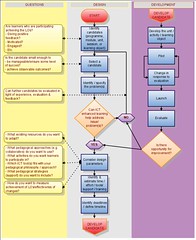 Image by hazelowendmc via Flickr
Image by hazelowendmc via FlickrThe main focus is to offer personalised learning in an environment with students engaged in activities where they are able to generate and co-construct knowledge through their interactions with other learners and teachers and with the activities and opportunities provided. The underpinning design places great importance on the students' background, culture and learning preferences. Learners will be supported by an eTutor in face-to-face and/or asynchronous mode, as well as with a designated off-site eTeacher who acts as a learning coach who guides and collaborates with students, partly through facilitating weekly webinar sessions with geographically diverse students. The programme of learning is to be mainly hosted in a Learning Management System (Moodle) site that functions as the formal hub for learning activities and resources. Asynchronous communication with peers, reflective activities, social interaction and learning, and communication with the eTeacher is hosted in a social networking space (Ning). Assessment (both formative and summative) is embedded within the programme, and includes peer-feedback and self-assessment. The project is just completed the trial phase, and evaluation will be collected from the students, eTutors, eTeachers, and support staff who have been involved. This feedback will be fed into the build of the pilot programme, and a formal research study will be carried out to measure whether the ICTELT blended design approach assists second language acquisition, as well as its effects on affective factors such as motivation.
To see this video full size go to: http://blip.tv/file/3791723






No comments:
Post a Comment